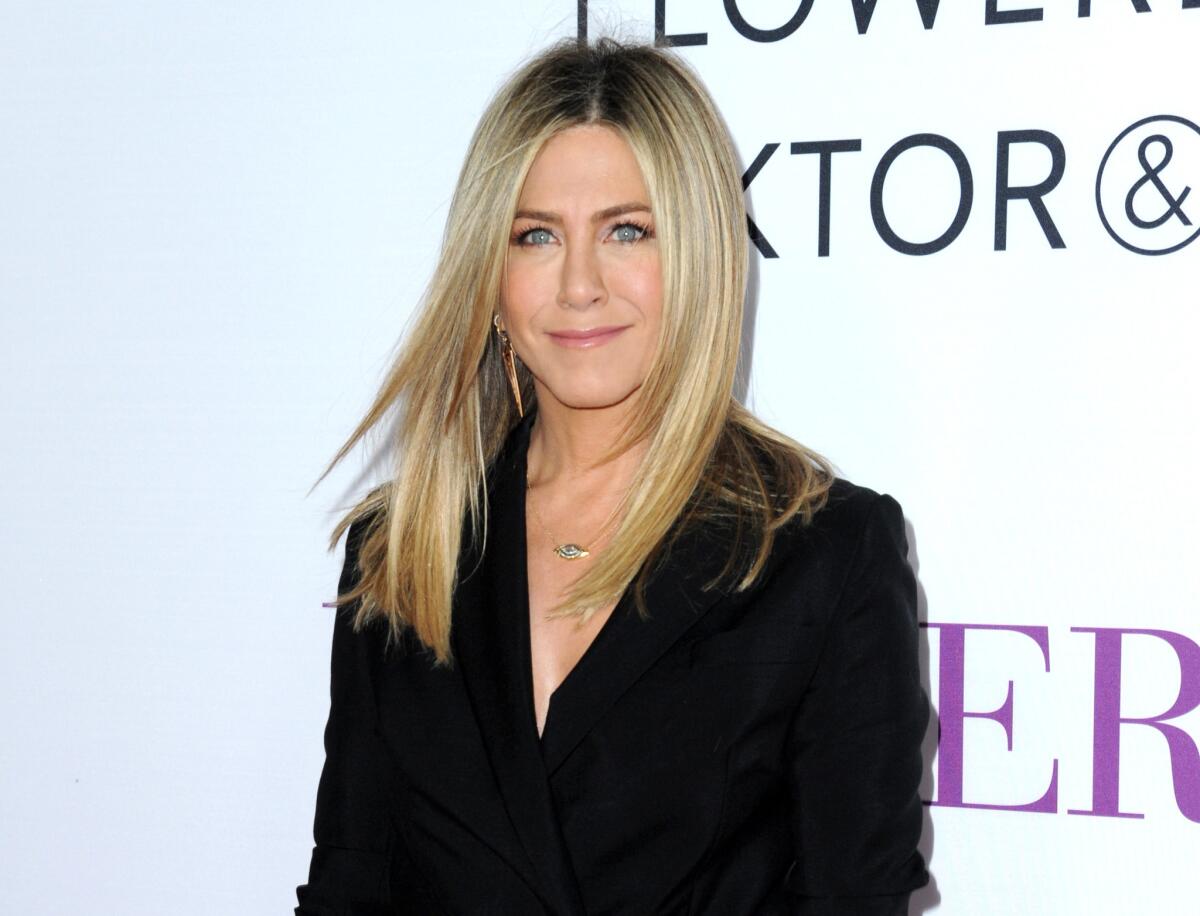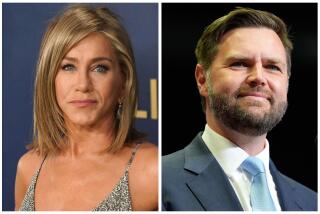Jennifer Aniston takes on the tabloids in scathing essay about body-shaming and sexism

Jennifer Aniston is mad as hell and she’s not going to take it anymore.
In an essay for Huffington Post entitled “For The Record,” Aniston took on tabloid culture where theorizing on her procreation (or lack thereof) serves as a renewable resource.
Aniston details the swarms of the photographers that camp outside her home, hoping to nab a photo that might begin the cycle anew.
She also explains, for the record, that she’s not pregnant. And that while she may enjoy being a mother some day, it’s not because she somehow feels incomplete as a woman.
“We are complete with or without a mate, with or without a child. We get to decide for ourselves what is beautiful when it comes to our bodies,” Aniston wrote in the most powerful passage of her essay. “We don’t need to be married or mothers to be complete. We get to determine our own ‘happily ever after’ for ourselves.”
While Aniston claims that worrying about whether or not she’s pregnant is small potatoes in light of a world rife with mass shootings and an upcoming presidential election, the larger issue she’s addressing, within celebrity culture and the world outside it, grows increasingly prevalent.
The actress may have penned her words after experiencing another month of pregnancy scrutiny, but the essay comes on the heels of several high-profile instances of the mainstream conversations that go on surrounding female celebrity bodies.
In June, L.A. Weekly published a column by Art Tavana entitled “Sky Ferreira’s Sex Appeal Is What Pop Music Needs Right Now” before going on to break down the musician’s assets and saying that Ferreira “looks like a more cherubic Sharon Stone, icy but also sweet, like a freshly licked lollipop.”
After the piece sparked an online uproar, L.A. Weekly apologized, saying that it crossed a line, but attempted to explain the article away as the author using deliberately inflammatory language to talk about Ferreira’s sexuality in her artistry.
We get to determine our own ‘happily ever after’ for ourselves.
— Jennifer Aniston
Last week, Vanity Fair published a profile of Australian actress Margot Robbie written by Rich Cohen, a paean to her beauty and the perceived lost purity of America.
“America is so far gone, we have to go to Australia to find a girl next door,” Cohen opened his piece with, before going on to describe Robbie’s physical appearance in depth, including the phrase, “She can be sexy and composed even while naked but only in character.”
The Vanity Fair profile also spurred outrage, with readers taking issue with the sexism and creepy undertones of the piece, but also with the basic geographical inaccuracies about Australia.
But perhaps the most egregious example of the pervasive sexism of celebrity culture came with a June 30 Variety column in which chief film critic Owen Gleiberman pondered whether or not Renée Zellweger is a different actress if she no longer looks like herself.
Gleiberman’s column was a response to the newest trailer for “Bridget Jones’s Baby” in which Zellweger is returning to a role she first played 15 years ago.

Watch the official trailer for “Bridget Jones’s Baby,” which hits theaters Sept. 16.
“Watching the trailer, I didn’t stare at the actress and think: She doesn’t look like Renée Zellweger. I thought: She doesn’t look like Bridget Jones! Oddly, that made it matter more,” Gleiberman wrote, before continuing, “Celebrities, like anyone else, have the right to look however they want, but the characters they play become part of us. I suddenly felt like something had been taken away.”
All of these examples come back to Aniston’s core complaint about the commodification of celebrities, be it their faces or their bodies or their lives. She expands her argument to look at the ways these perceptions create a toxic culture for all women, particularly the most impressionable of all.
“Sometimes cultural standards just need a different perspective so we can see them for what they really are — a collective acceptance... a subconscious agreement. We are in charge of our agreement. Little girls everywhere are absorbing our agreement, passive or otherwise,” Aniston wrote.
She ends her piece with an acknowledgement that tabloids won’t change any time soon, but that shouldn’t render people powerless.
“What can change is our awareness and reaction to the toxic messages buried within these seemingly harmless stories served up as truth and shaping our ideas of who we are.”
Twitter: @midwestspitfire
ALSO
Calvin Harris blasts ex Taylor Swift on Twitter: ‘You need someone new to try and bury’
The oral history of ‘Bridget Jones’s Diary’ from Renée Zellweger, Colin Firth and more
Kobe and Vanessa Bryant are expecting their third child, ‘Baby Mamba’
More to Read
The biggest entertainment stories
Get our big stories about Hollywood, film, television, music, arts, culture and more right in your inbox as soon as they publish.
You may occasionally receive promotional content from the Los Angeles Times.











